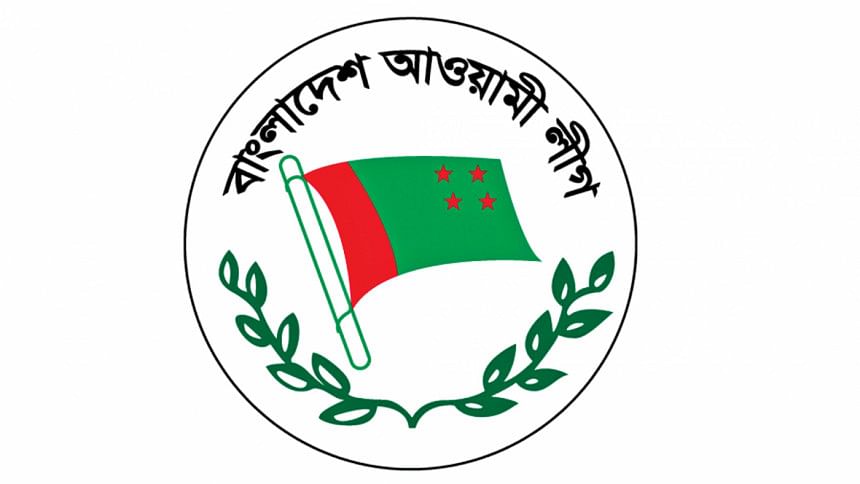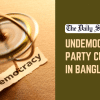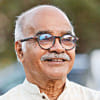75th Anniversary: It’s high time AL went into introspection

The Awami League, one of the oldest and largest political parties in the country, is set to celebrate its 75th founding anniversary today.
It had been at the forefront of almost all democratic movements before and after the birth of Bangladesh. It also led the the nation to independence.
On June 23, 1949, East Pakistan Awami Muslim League was founded by the likes of Maulana Abdul Hamid Khan Bhashani, Huseyn Shaheed Suhrawardy, Shamsul Haque and Ataur Rahman Khan. To make it more pluralistic and non-communal, the word "Muslim" was dropped from its name in 1955, and it was renamed Awami League.
The party played key roles in the Language Movement in 1952, Jukta Front election in 1954, anti-Ayub movement, Education Movement in 1962, Six-Point Movement in 1966, and the students' 11-point movement in 1969, and thus came out as the most authentic voice of the people.
The AL faced a crisis following ideological conflicts between Suhrawardy and Bhashani in the late 50s. In the early 60s, Sheikh Mujibur Rahman, already popular among students, emerged as a promising leader.
Later, under his leadership, Bangladesh went on to become independent.
The AL faced an existential crisis after August 15, 1975, when its supreme leader Bangabandhu and most of his family members were killed.
Sheikh Hasina, Bangabandhu's elder daughter, returned home from abroad in 1981 and rebuilt the party.
She has been leading the organisation for 43 years as its longest serving chief. Under her leadership, the party has assumed power five times.
Besides, the achievements of Hasina's government are unparalleled compared to those of any other government.
However, some fundamental questions can still be raised as the AL turns 75 today.
Is the party doing justice to its name? Awam, an Urdu word from which its name was derived, means "the people".
Is the party still the "voice" of the people like it was in the past? Is it still true to its ideals today?
The activities of the AL in recent years show that the party has deviated a lot from its core ideals. The party that once considered itself as an activist-oriented organisation has shifted its dependency towards the bureaucracy and law enforcement agencies. It always spoke in favour of people's fundamental rights, but now it is mostly confined to making rhetorical statements on the government's development activities.
Businesspeople are now gaining more influence in the party ranks surpassing the politicians. The party that had fought to ensure people's voting rights has now developed a system of electing public representatives unopposed and holding electoral contests among the AL members amid boycott by a large number of opposition parties.
In many of his speeches during 1972-75, Father of the Nation Bangabandhu Sheikh Mujibur Rahman had mentioned corruption as the main evil hindering the country's development. He had dreamt of a corruption- and exploitation-free secular Bangladesh.
But according to the latest Household Income and Expenditure Survey, income inequality is all-time high in the country. The top 10 percent of the wealthiest households now hold 40.92 percent of its total income.
Former and current bureaucrats, law enforcers, politicians, businesspeople and other professionals now hog the headlines for allegations of corruption.
Within six years after its founding, the word "Muslim" was dropped from party's original name. But its deal with Khelafat Majlish in 2006, its policy to appease Islamist group Hefajat-e-Islam and dropping of contents written by Hindu and freethinking writers from school textbooks following Hefajat's demands raised questions about the AL's secular character.
Party leaders always claim that no one can defeat a united AL. But the question remains how united the party actually is. In the absence of activities by opposition parties, it seems AL itself has become its main enemy.
In its 2018 electoral manifesto, the AL's two major promises were to contain price hike of essentials and take effective action against corruption. In its electoral manifesto in 2024, the party reiterated its pledge to cut the prices of commodities and keep those within an affordable range.
After forming the government in January this year for a fourth consecutive term, the AL took some initiatives to keep the prices of essentials under control, but they seem inadequate.
According to the latest data of Bangladesh Bureau of Statistics, food inflation surged 54 basis points to 10.76 percent from 10.22 percent while non-food inflation slipped 15 basis points to 9.19 percent from 9.34 percent in April, which is the highest rise on the Consumer Price Index in seven months.
The government's steps to check corruption did not meet people's expectations. Over the last 15 years, loan scams and indiscipline ruled the financial sector.
In its manifesto in 2008, the AL had vowed to make the wealth statements of ministers, MPs and their family members public every year, but it did not make good on the pledge. This promise was not mentioned in the three subsequent electoral manifestos.
The party had pledged to enforce laws to recover defaulted loans. However, Bangladesh Bank data shows that defaulted loans at banks hit an all-time high of Tk 1,82,295 crore at the end of March this year.
The AL had also assured the people of building a reliable electoral system. But it had to field dummy candidates in the January 7 national election to make sure the polls look participatory. It also had to restrain from fielding candidates in this year's upazila parishad elections to make sure the polls look participatory.
Due to the party's electoral strategy, AL men fought against their fellow party colleagues in the national and local elections.
And whenever any AL member is found involved in any wrongdoing, party leaders make the same old claim -- "some infiltrators from BNP-Jamaat are tainting Awami League's image".
Does the AL know who are its tested men, how many of its supporters are loyal to its core ideals and how many of them will respond to the party's call in the event of a crisis?
As AL celebrates its 75th founding anniversary, people expect that it will do justice to its name and gain strength to build a secular and democratic Bangladesh.

 For all latest news, follow The Daily Star's Google News channel.
For all latest news, follow The Daily Star's Google News channel. 









Comments